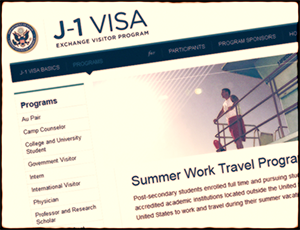
[Updated 3/14/21 to explain the role of Ecuador in the program.]
The Summer Work Travel program (SWT), whose exploitation of foreign college students was thoroughly exposed a few years ago by my then-colleague Jerry Kammer, just about disappeared in the summer of 2020.
This was not because the State Department (which more or less supervises this exchange program) did anything to reform it, it was because of Covid-19. The program had been operating at about the 100,000-a year level for years, but last summer there were, according to State, 4,952 alien participants, a 95 percent reduction. That number was provided to us by a State Department official as background.
The scheme apparently will — to some extent — be restored this coming summer.
SWT is supposed to be a "cultural exchange" program in which overseas college students come to the U.S. to experience American life while working. What it has become, as Kammer showed us in painful detail, is just another cheap foreign labor program, with little or no cultural benefits to anyone, but a massive break to SWT employers, most of whom are in the seasonal hospitality business, such as resorts and carnivals.
Among the abuses of the program were these, according to a former Russian participant in the program, as we reported last year. That program critic, in his own words, had this to say about it:
Already ridiculously high price tag for the diplomatic initiative has increased further. SWT program costs ballooned due buying elevated air tickets on short notice (50-200% up), much higher start-up and reserve money requirements (>$1,200), extra insurance, drugs and other prevention expenses. By the time students arrive to US and start their low paying minimum wage jobs they accumulate large debt (>~$3,000). With very limited job opportunities beyond the contracted employer, students essentially become a bonded labor for that employer. Therefore vulnerability and risk of abuse and exploitation of students is significantly up.
One of the mysteries of the program is what nations have supplied most of these workers; you would think that an agency involved in international affairs would keep track of such matters, but the CATO Institute's (generally friendly) report on this program notes:
With 7,001, Ireland was the most common country of origin for Summer Work Travel program participants in 2015 — the only year for which that information is publicly available. The rest of the top 5 included Bulgaria, China, Romania, and Ukraine, each with more than 5,000.
With the exception of Ireland, these are all low-income countries and all currently, or recently, were run by the Communist Party; places where summer job opportunities may not be the best.
Given that information on the usual home nations of these workers, we find that last summer the major nations of origin (according to State) were Ecuador, 1,704; Turkey, 908; and Russia, 487. There is no overlap between the list of five and the list of three.
At first I was puzzled by the inclusion of Ecuador at the top of the list of nations of origin, and then a reader of an earlier version of this posting told me that the reason that nation was in first place was because it is below (or just on) the equator, and the summer of 2020 came earlier to it, and to the rest of the southern hemisphere, than it did for the rest of us living on this side of the equator. Hence Covid-19 was not yet a problem when the SWT visas were issued in that country.
I had been operating while wearing Northern-Hemisphere blinders; it had not dawned on me that program could have a different timetable for the two different parts of the globe.
SWT generally, however, does not have the political pull of agri-business. While most of the worker slots were not used in that summer program (involving J visas), big agriculture got most of the foreign farmworkers (H-2As) that they wanted.
The two programs just mentioned have something in common. Neither the employers nor the workers, in either program, pay a dime into the Social Security and Medicare trust funds; while those in the H-2B and H-1B programs do pay their fair shares.
It is not clear how much the summer program will be revived this year; in the past, most arrangements for it have been made by this time of year, and visas issued. The earlier Trump administration orders that curtailed the program have been overruled, in one case, and, we gather, will be allowed to die on March 31. This is the official statement on those issues:
On February 24, President Biden rescinded Presidential Proclamation (P.P.) 10014 that suspended entry of immigrants who present a risk to the United States labor market during the economic recovery following the 2019 Novel Coronavirus Outbreak. For further information, please visit https://travel.state.gov/content/travel/en/News/visas-news/rescission-of-presidential-proclamation-10014.html. P.P. 10052 remains in effect and is scheduled to expire on March 31, 2021. P.P. 10052 suspends the entry to the United States of certain nonimmigrant visa applicants who present a risk to the U.S. labor market during the economic recovery following the novel coronavirus outbreak. It applies to J-1 visa applicants participating in the intern, trainee, teacher, camp counselor, au pair, or summer work travel programs.
It will be interesting to see how much of SWT will be revived this year; will the Covid-19 inspired non-issuance of visas so far this year hamper the program? Will employers once deprived of the goodies of the program have learned to work with other sources of workers?
I suspect that the latter alternative will not be the case.
